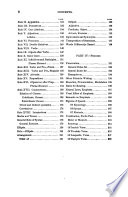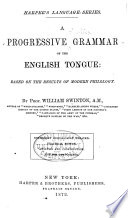 | Lindley MURRAY, Charlotte KENNION - 1842 - 180 pages
...will succeed. 5. O/ Shall and Will. The sign of the future tense in the indicative mood is generally shall in the first person, and will in the second and third. Sometimes, however, shall is also used in the second and third persons : as, My servant will carry... | |
 | Stephen W. Clark - 1855 - 258 pages
...hereafter, is in the Future Tense. EXAMPLE — James will return to-morrow — I shall see him. OBS, — Shall, in the First Person, and will, in the Second and .Third, are the signs of this Tense. Rem. — Distinctions of time are not indicated with precision by the... | |
 | L. T. Covell - English language - 1855 - 256 pages
...may denotes possibility or permission; can, ability or power; and mutt, necessity or obligation. 2. Shall, in the first person, and will, in the second and third, express a prediction or resolution ; while will, in the first, and shall, in the second and third,... | |
 | Nathaniel Holmes Morison - English language - 1856 - 92 pages
...precisely corresponding with each other in sense, and with the above explanation of their meaning. Shall, in the first person, and will, in the second and third, never imply either a promise or authority, but express simple futurity. In this sense, I shall go ;... | |
 | L. T. Covell - 1861 - 252 pages
...may denotes possibility or permission ; raw, ability or power; and must, necessity or obligation. 2. Shall, in the first person, and will, in the second and third, express a prediction or resolution; while will, in the first, and shall, in the second and third, express... | |
 | James Roscoe Mongan - 1864 - 300 pages
...third simply foretell ; as, " I shall go ;" " You will receive a letter ;" " He will be rewarded." Shall, in the first person and will, in the second and third constitute the Dimple form of the Future Tense. (6.) Will in the first person implies determination,... | |
 | Thomas Wadleigh Harvey - English language - 1878 - 268 pages
...should be. Past Perfect, . I might, could, would, or should have been. REGULAR CONJUGATION. Note. — Shall, in the first person, and will, in the second and third, future tenses, are used to denote futurity. When will is used in the first person, or shall, in the... | |
 | Samuel Stillman Greene - English language - 1868 - 200 pages
...necessity or obltyation. Slmll and mil, in general, denote./u(uri(y. NOTE. In declarative sentences, shall, in the first person, and will, in the second and third, predict or express determination ; while vtitt, in the fi st, and sliall, in the second and third,... | |
 | William Swinton - English language - 1872 - 232 pages
...) You ) ,„ } shall write. He > will write. '• ' They ) 347. The reason of the preceding use of shall in the first person, and will in the second and third persons, seems to be this : When a person says, ' I shall write a letter,' he expresses his own obligation... | |
 | John Seely Hart - English language - 1874 - 258 pages
...of the Futures, we have two Auxiliaries, shall and will. For the expression of simple futurity, we use shall in the First Person, and will in the Second and Third Persons, as given in the table. On the other hand, by using will in the First Person, and shall in... | |
| |